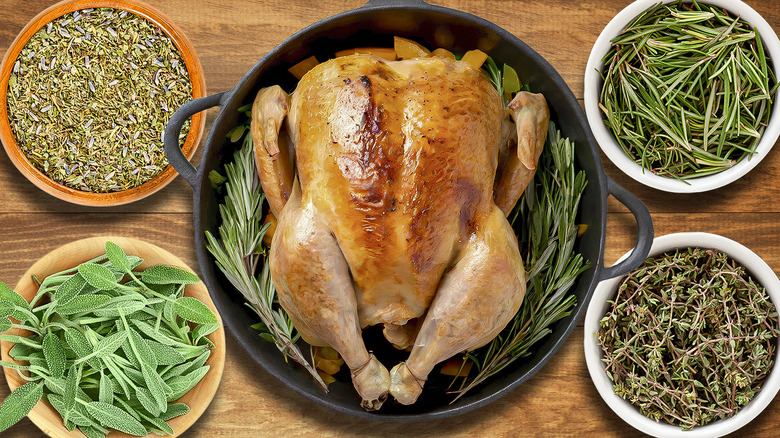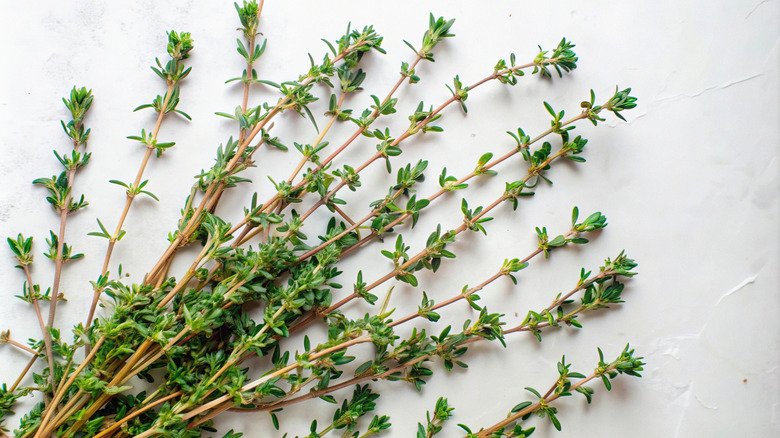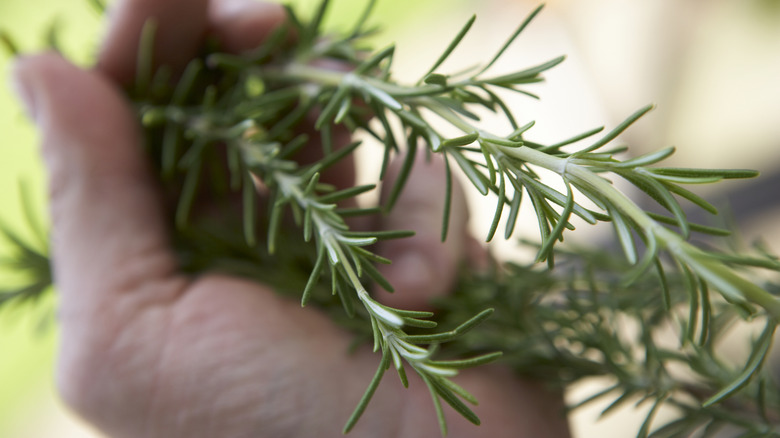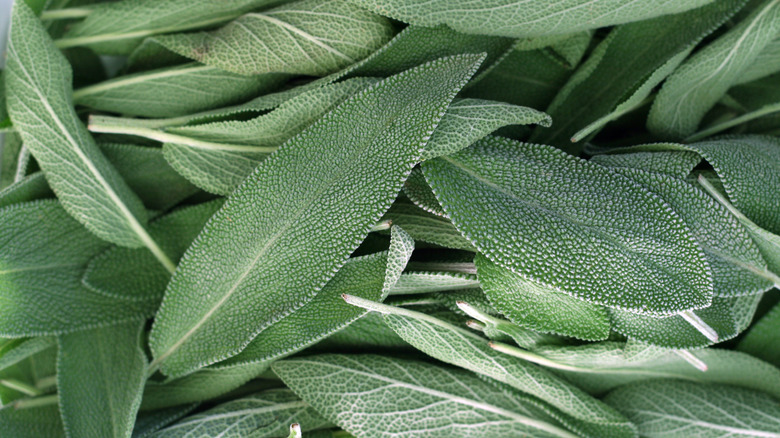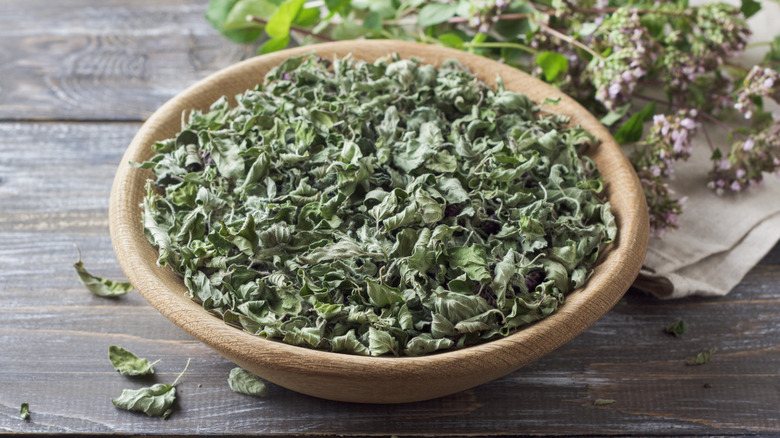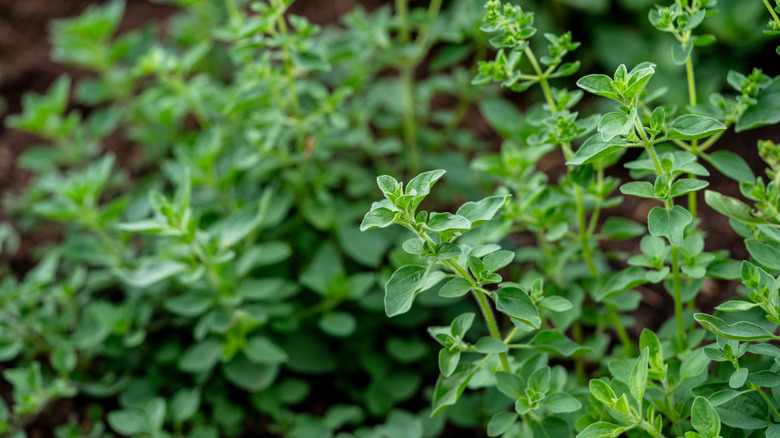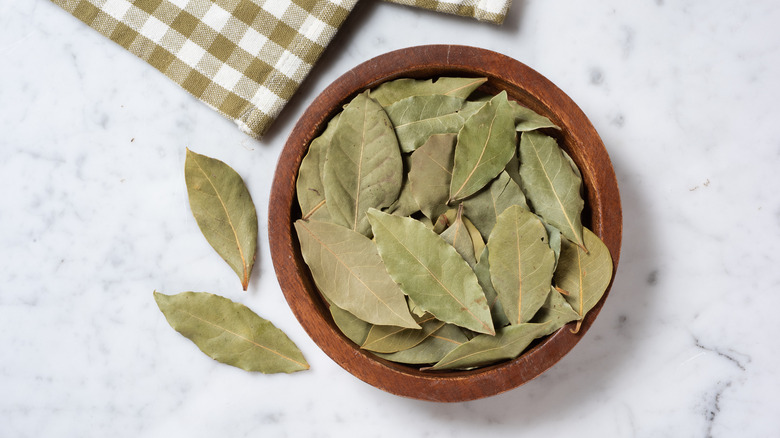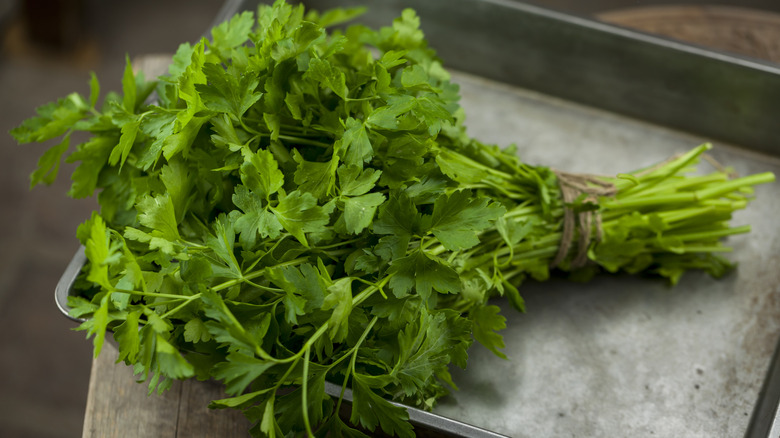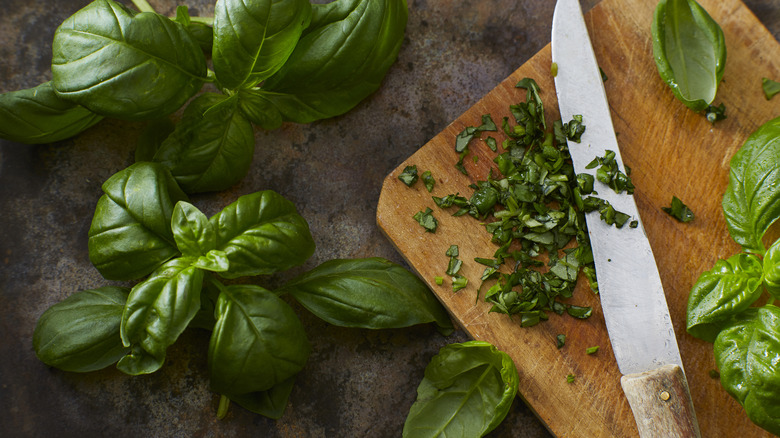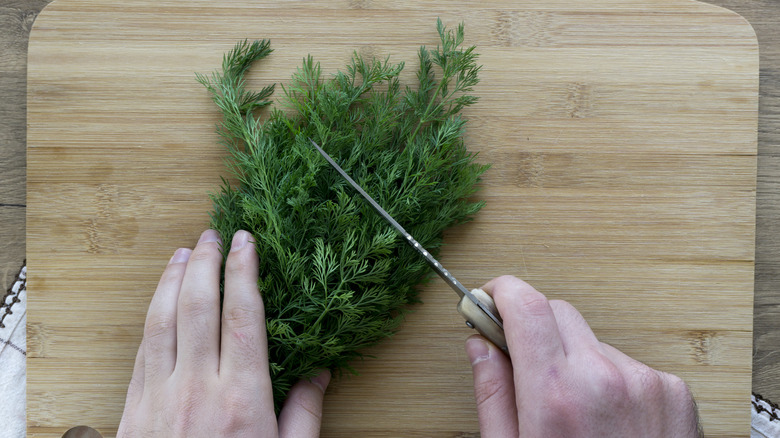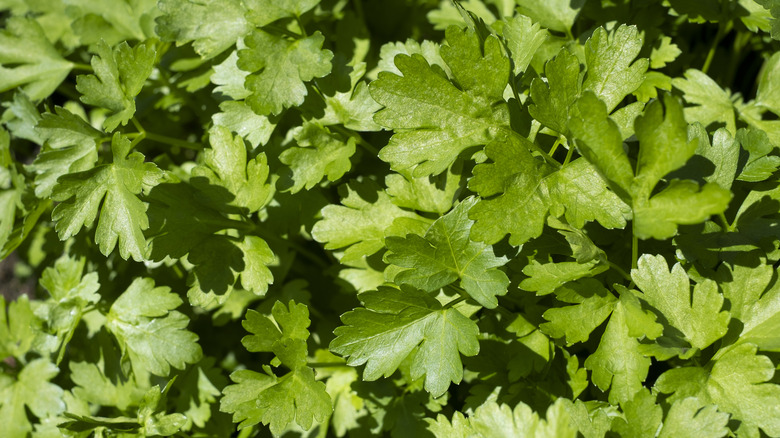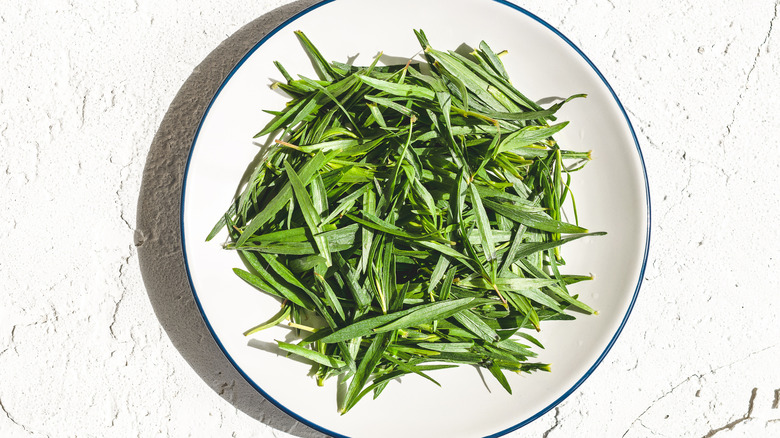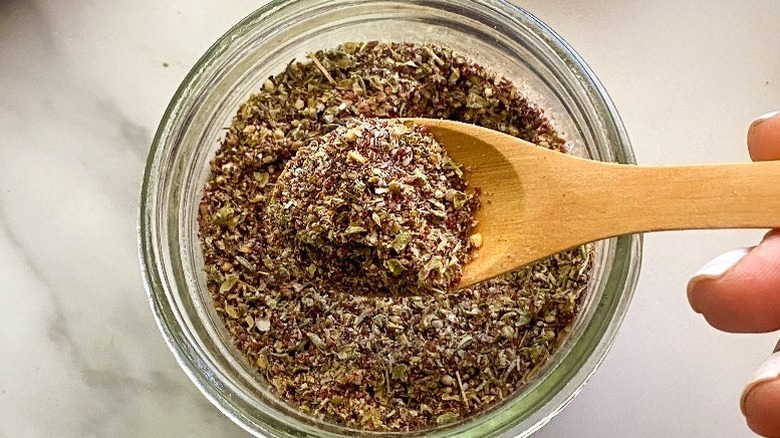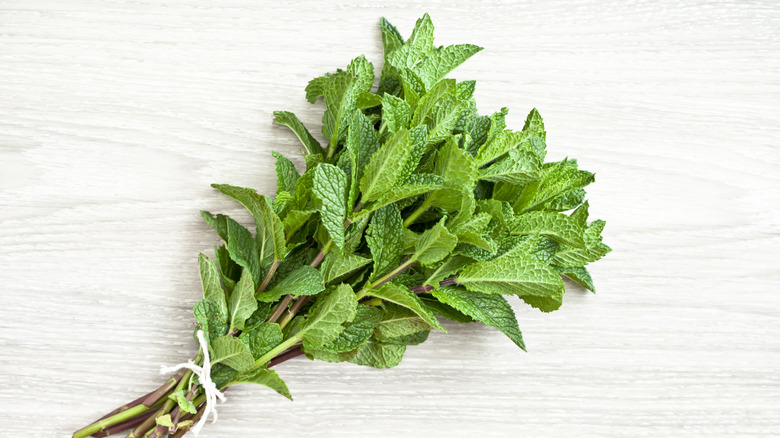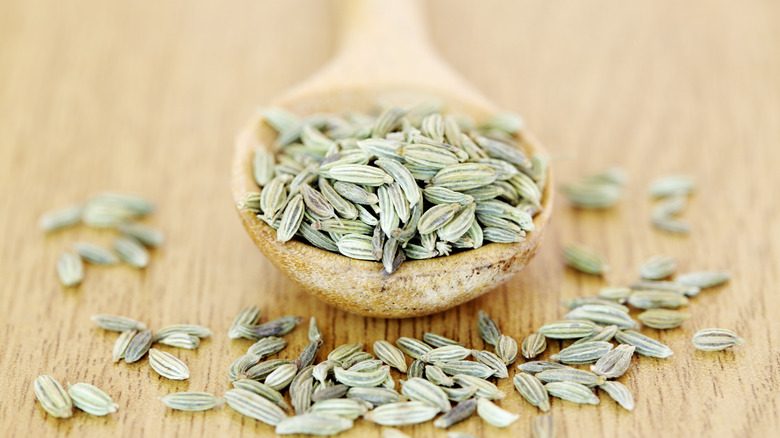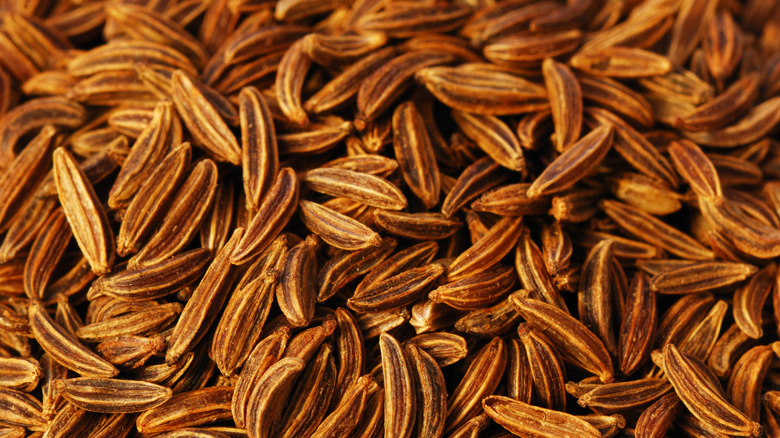15 Delicious Herbs To Season Your Roast Turkey
A perfectly roasted turkey is the centerpiece of any festive feast, and one of the best ways to enhance that golden skin and juicy meat is by seasoning the bird with a medley of delicious herbs. This can take a turkey from bland to bursting with aromatic flavor, adding depth, freshness, and warmth. You might think you already have your turkey seasoning technique down, but with such a wide range of herbs pairing so beautifully with this meat, there's always a new flavor combination to try.
Perhaps you prefer the timeless classics like rosemary and sage, or you're looking to try something a little more adventurous like za'atar or fennel seeds. Each herb will bring a unique flavor profile, ranging from piney and earthy to bright and citrusy. And when it comes to prep, there are plenty of ways to incorporate them. You can add the seasonings directly to the skin, tuck them underneath it, sprinkle them into the cavity, or blend them into a butter rub. With endless ways to personalize your turkey, herbs are always a good idea, so let's run through some of the best options that are sure to make your next holiday roast one to remember.
Thyme
Thyme is an incredibly popular choice when it comes to seasoning turkey, and for good reason. Its earthy and slightly floral taste pairs beautifully with poultry, working to enhance its natural savory flavor. Using thyme is the perfect way to bring a touch of elegance to your dish, and there are a few different ways you can incorporate it.
For a roast turkey, fresh thyme sprigs tend to deliver the most flavor. You can chop the leaves finely or mince them using a mortar and pestle, and combine them with any other herbs or aromatics or choice. This can then be rubbed all over the skin of the turkey before roasting. Another great method is to combine the thyme with softened butter, which is perfect for smearing all over the turkey or stuffing under the breast skin to add richness as well as those wonderful herbaceous flavors.
Thyme pairs particularly well with rosemary and sage, as well as other aromatics like lemon and garlic. It's also a great companion in gravy making, where whole sprigs can be simmered with the turkey drippings to create a rich broth. You could even reserve a sprig or two to garnish the turkey before serving.
Rosemary
Another classic herb for a succulent roast turkey, rosemary brings a fragrant, pine-like aroma that adds plenty of depth to the final dish. It's a versatile addition to any seasoning mixture, pairing well with plenty of other flavors.
Fresh rosemary sprigs will work best for seasoning your turkey, and once you've stripped the rosemary leaves from the stem, these can be chopped up finely. Around two tablespoons of the chopped herb will be enough to season an average 12 pound turkey. Pair the rosemary with a simple mixture of salt and black pepper, or make some other additions to the mix for the ultimate well-rounded result. Rosemary makes an excellent accompaniment to garlic, fresh basil, and Italian seasoning. Try combining these ingredients with olive oil and brushing this flavorful mixture all over the turkey, as well as rubbing it underneath the skin, before roasting.
With its almost tree-like appearance, this herb makes a beautiful festive garnish too. Scatter fresh sprigs all around your perfectly roasted turkey, perhaps alongside some charred lemon halves, or even fresh fruits like apple wedges and cranberries, for a stunning Thanksgiving or Christmas centerpiece.
Sage
Synonymous with holiday cooking, sage has a warm, earthy flavor that's the perfect match for roast turkey. With a peppery and woody profile, sage adds a deep, comforting richness to the meat, making it an excellent addition to any festive feast.
Fresh sage leaves are wonderfully versatile. You can chop them finely and mix them into softened butter, then spread this mixture onto the turkey skin, or place whole leaves underneath the skin and inside the cavity for a fragrant roast. For easier prep, dried sage can work here too, especially when combined with other herbs like thyme and rosemary. This trio often features in roast turkey recipes, as the main components of the flavorful rub. You can also fry whole sage leaves in oil or butter to create an elegant crispy garnish for your serving platter.
Sage also features in countless traditional stuffing recipes, so it can be nice to have the same flavors running through both the meat and this beloved side dish. The fresh chopped leaves are typically added to buttery sauteed vegetables and aromatics, before tossing the mixture with bread cubes, broth, and beaten eggs, and baking everything in the oven until crisp and golden on top.
Oregano
A herb that's packed with Mediterranean flavor, oregano is fantastic for adding a fresh, peppery note to your turkey, especially when used as part of a medley of other herbs or even warming spices.
The dried, chopped oregano you'd typically find in the spice aisle, as well as dried or fresh whole leaves or sprigs can all work brilliantly for seasoning your turkey. Just make sure to chop whole leaves finely if you're adding them to a rub or infused butter. Whole sprigs can however be placed inside the cavity or under the skin. Try combining oregano with lemon or orange zest, paprika, rosemary, thyme, salt, and pepper for a bright and herbal blend that's perfect for rubbing onto the turkey skin. You can even season it a day in advance and pop the bird in the fridge until about an hour before you're ready to put it in the oven.
Oregano is another herb that pairs brilliantly with citrus fruits and aromatics, so try stuffing the turkey cavity with halved lemons or oranges, whole garlic bulbs, and perhaps some onion wedges too. The result will be a mouth-watering, savory roast that's bursting with flavor.
Marjoram
Marjoram is the softer, sweeter cousin of oregano, with a mild, floral, and subtly citrusy flavor that makes it an amazing seasoning option for turkey. Its delicate taste enhances the savory goodness of the meat without being too overpowering, so can make a great substitute for oregano if you find that this can sometimes be too intense for your taste.
Like most other herbs, there are a few ways you can add it to the turkey. Rub dried marjoram or finely chopped fresh leaves directly onto the skin, or add the herb to a softened butter or olive oil mixture, perhaps alongside other herbs like sage, rosemary, and thyme. Brush this onto the turkey to create a beautifully crisp and golden, herb-covered skin once roasted. Or, pop whole marjoram sprigs into the turkey cavity along with chopped apples, onions, and oranges for a deeply aromatic filling. Marjoram can also be used to enhance your turkey gravy. Add a sprig or a small pinch to the drippings and allow it to infuse the liquid as it simmers away.
Bay leaves
Bay leaves are a subtle herb that you may well already have on hand for adding to homemade soups and stews. But, they're also great for infusing roast turkey with a delicate, aromatic taste. This herb has a unique flavor profile, with notes of pine and eucalyptus, and it typically comes in the form of whole, dried leaves.
Whilst the bay leaves themselves are not eaten, they work their magic during the cooking process. The whole leaves can be added to the turkey cavity as part of an aromatic medley, where they'll work to infuse the meat as it roasts, without breaking down or becoming mushy. Since they tend to impart more of a quiet background flavor note, pair bay leaves with stronger herbs like thyme or rosemary for a well-rounded seasoning blend. After cooking, the bay leaves can simply be removed and discarded.
Bay leaves are also ideal for creating a flavorful stock or brine. Simmer them in water with salt, pepper, plus other herbs and aromatics to create a brine that tenderizes the meat while subtly enhancing its flavor. Or, add a couple of leaves to the roasting pan to infuse the juices and create a richly flavored base for your gravy.
Parsley
Parsley is often considered a garnish, but its bright, fresh flavor makes it a wonderful ingredient for seasoning roast turkey. This herb has a slightly citrusy note, but its less pungent than others like oregano or thyme, which makes it a versatile addition to any turkey-enhancing herb mixture.
For the most impact, opt for fresh parsley. The easiest way to use it is to chop the leaves finely and mix them with softened butter. Garlic, sage, rosemary, or thyme would all make great additions here too. Spread this mixture under the skin and over the bird for a beautiful golden crust and plenty of fresh flavor. If you have dried parsley to hand, this will be easier to incorporate into a dry rub mix.
Flat-leaf parsley, also known as Italian parsley, is more flavorful and tender than curly parsley, which makes it the best choice when it comes to seasoning turkey. You can of course use this as a vibrant fresh garnish for the freshly roasted turkey, too.
Basil
If you thought basil was for pesto sauce and Italian-inspired pasta dishes only, think again. This sweet and earthy herb can give your roasted turkey a delicious twist. With its unmistakable fragrance, basil brings a fresh and vibrant dimension to the meat.
Like many other herbs, basil is widely available in both fresh and dried forms. Either can be used here, but basil will provide a punchier flavor in its fresh form. Whipping up a classic softened butter mixture is the best way to incorporate the fresh, chopped leaves into your turkey roast. Try combining them with parsley and rosemary for a perfectly balanced herbaceous trio. Or, to make an aromatic rub, pair dried basil with garlic powder, salt, black pepper, and ground sage.
For stuffing the turkey cavity, use whole basil leaves with lemon and garlic for a Mediterranean-inspired combination that'll produce a mouth-watering aroma as the bird roasts. Alternatively, chop basil and mix it into the stuffing itself for a fresh herbal kick.
Dill
This herb is incredibly popular in the world of seafood, but it can work just as fantastically alongside the mild, savory succulence of turkey. Dill has a fresh, tangy sweetness that will add a unique flavor profile to the meat, giving it an edge over more traditionally seasoned birds.
Fresh dill is your best bet here. Finely chop the feathery leaves and blend them into a butter with some other bold additions such as cilantro, parsley, and plenty of garlic. One top tip is to transfer the butter mixture to a plastic food bag and shape it into a long sausage. Once chilled until hardened, you can then slice the log up into herb butter coins, which can be stuffed underneath the turkey skin.
You can also add fresh dill sprigs to a butter-free rub. Just blitz these up in a food processor, or crush them in a mortar and pestle, along with fresh parsley, thyme leaves, orange and lemon zest, salt, and sugar, then rub this generously all over the turkey skin as well as inside the cavity. For maximum flavor, let the seasoned bird sit in the fridge overnight before roasting.
Cilantro
Perhaps one of the boldest herbs, cilantro is another great choice for adding fresh, citrusy flavor to your turkey. Though its typical uses in your kitchen might include scattering over tacos or stirring into salsas, there's no reason why this zesty herb can't be part of an epic turkey roast.
Choose fresh cilantro for your turkey, which is not only the easiest form to get hold of, but also has the deepest flavor. Chop the leaves and stems finely and add them to your herbed butter or rub. Cilantro stems actually hold plenty of flavor, so there's no need to waste them! This herb will pair well with the classics like rosemary and thyme, as well as the subtle peppery notes of parsley, and earthiness of sage.
Cilantro can also shine in post-roast dishes or accompanying sauces. Use it in a homemade chimichurri or a fresh herb salsa to drizzle over leftover sliced turkey, or scatter the fresh chopped leaves over a steaming bowlful of turkey curry.
Tarragon
Tarragon is a distinct and often underrated herb, described as having a sweet, licorice-like flavor, with notes of bitterness too. It's a herb that's sure to add a delicate and refined feel to your roast, fitting right in alongside the other popular aromatic additions.
If you're adding tarragon to a softened butter mixture, first chop it up finely. An amazing combination for mixing through the butter would be tarragon, orange zest, and garlic, for a delicious balance of brightness, sweetness, and aromatic flavor that'll infuse the meat beautifully. Whole sprigs of tarragon are also great for adding to the turkey cavity.
There are other ways to incorporate tarragon into your festive feast too. Try adding sprigs to a brine with whole peppercorns and allspice berries to infuse it with some punchy flavors, or mix it into your stuffing for a unique twist. You'll find that it pairs especially well with acidic, citrusy flavors.
Za'atar
If you're not familiar with this vibrant Middle Eastern blend, it certainly deserves a place in your pantry, and better still, on your next roasted turkey. Za'atar is not just one herb, but in fact a carefully crafted medley of multiple herbs and ingredients. The mixture typically contains toasted and ground sesame seeds, sumac, marjoram, oregano, thyme, and salt. You can even mix up your own blend at home.
Za'atar's combination of herbaceous, tangy, and nutty flavors makes it an incredible addition to poultry. It's the perfect option if you're looking to incorporate the flavors of traditional herbs, but with a slight twist. And, whilst this fragrant blend can absolutely stand alone as a seasoning, there's also the option to pair it with other herbs and spices, such as paprika, rosemary, or extra oregano and thyme. Or, simply add the za'atar to some olive oil with a generous pinch of salt and black pepper, and brush this all over the turkey before roasting.
Mint
It might not seem like a natural choice for turkey, but give mint a try, and you'll be pleasantly surprised by the fresh twist it can offer. Its light and cooling qualities can serve as the ultimate balancer for the richness of the meat, it'll work great with other bright, zesty ingredients like lemon and orange.
As with most fresh herbs, whole mint leaves will need finely chopping before you add them to an oil or butter mixture. Dried mint can work well too, whether you're rubbing it directly onto the turkey skin, or incorporating it into a blend first. Some delicious pairings for mint include garlic, parsley, oregano, and lemon zest, for a Greek-inspired flavor combination.
Aside from on the turkey, using mint is also a wonderful way to enhance sauces and glazes. Blend chopped leaves with honey and a splash of water for a sweet and tangy glaze to brush over the turkey just before serving. Or, prepare a mint and yogurt dipping sauce for a refreshing addition to your holiday spread.
Fennel seeds
Fennel seeds have a potent, licorice-like flavor and subtle warmth, that can transform a basic roast turkey into something deeply aromatic. These seeds can bring a unique complexity to the meat, and add a touch of sophistication too.
Since fennel seeds are fairly large, they'll need grinding up before you can use them as a seasoning. To do this, blitz the seeds in a spice grinder, or crush them in a mortar and pestle. There's also the option to toast the seeds lightly in a dry pan prior to grinding, which helps to intensify their flavor. To make a simple fennel seed rub, mix the ground seeds with salt and black pepper, or for a spicier option, combine it with paprika and celery salt. Whichever mixture you choose, rub this all over the turkey's skin, up to a day in advance if desired.
Despite its strong flavor, fennel complements a range of other herbs, so you can always use a fennel rub in conjunction with a herbed butter stuffed underneath the skin too. Garlic and lemon zest would both be excellent additions to the butter mixture.
Caraway seeds
Another herb that's perfect for lovers of that distinct licorice aroma, caraway seeds have a flavor that's certainly in the same vein as fennel seeds, with notes of pepper, earthiness, and citrus. They're another unique option that can make your roast turkey a truly memorable centrepiece.
There are the few different ways to use caraway seeds on your turkey. You can either pat the skin dry and rub the seeds on as they are with some salt and pepper, or crush them up first in a mortar and pestle or spice grinder. The crushed seeds can also be combined with other ingredients, such as brown sugar and thyme, for a more balanced rub. Of course, you can add crushed caraway seeds to softened butter too, if you'd prefer to season the bird this way.
Caraway can also make a great addition to stuffing. Try combining it with sage and parsley, as well as the classic egg, vegetable, and breadcrumb mixture, for a wonderfully hearty Thanksgiving side dish.
